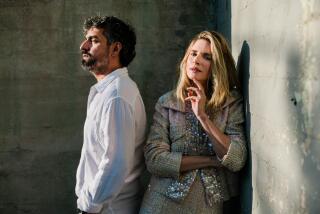Psychoanalyzing Britain : A NATURAL CURIOSITY <i> by Margaret Drabble (Viking: $19.95; 309 pp.) </i>
- Share via
Natural curiosity is usually an apologetic phrase--oh, it’s just natural curiosity, she can’t help it--and Margaret Drabble’s new novel, a sequel to “The Radiant Way,” comes with a curiously apologetic preface for an established writer: “I had not intended to write a sequel, but felt that the earlier novel was in some way unfinished, that it had asked questions it had not answered.”
“The Radiant Way” made a pessimistic analysis of Thatcher’s divided, disaffected country (1979-1985) from the vantage point of three women, old Cambridge friends, who stand for three different forms of professional curiosity. Liz, a successful psychotherapist with a dark family past (agoraphobic mother, absentee father), wants “to make sense of things”; Alix, an old-style left-winger, prison visitor and teacher, wants “to change things,” and Esther, a German art historian, wants “to acquire interesting information.” All have a buried obsession, which emerges to take its revenge.
“A Natural Curiosity,” set in 1987, is, its quasi-apologetic narrator insists, “not a political novel. More a pathological novel. A psychotic novel. Sorry bout that.” So the earlier book’s rather ordinary surveys of the Appalling State of the Nation now take second place to the pursuit of suppressed myths. It’s an anthropological excavation of what underlies a civilization that increasingly manifests symptoms of “mass psychosis.” The theme is now not so much history as destiny.
There is more thought than action going on. (An old poet, Beaver, tells Alix, who is researching his buried past, that poems can be “bits and pieces,” but novels need “narrative sequence. Solid chronology.” Drabble, this suggests, is trying to desolidify her narrative.) Alix, now the central figure, is taking a dangerous interest in one of her prisoners, Paul, a “lifer” who decapitated his five victims out of an obsession with ancient human sacrifices. Convinced that such acts can be explained (“Nobody knowingly chooses evil,” she believes), Alix goes in pursuit of his father (a butcher) and, at last, his horrifying mother, the novel’s Medusa.
Liz puts herself professionally at risk by suggesting on TV that the age of consent should be lowered, that child abuse should not be “criminalized,” and uncovers the true story of her own childhood. Liz’s ex-husband makes his own dangerous quest to the Middle East. Her sister Shirley runs away from her depressive husband and changes her life. And various subsidiary characters (“They will serve only as occasional chorus,” says the narrator nudgingly) take steps beyond what is habitual and permitted.
All are suffering from the human disease of “curiosity,” which can be “fatal” as well as “natural.” Medusa’s gorgon head, the novel’s key image, may turn us to stone, but we still have to seek her. She is “our hidden knowledge,” and the civilizations that try to cover this over (like Caesar’s eradication of the Celtic gods, repeatedly alluded to) will suffer from it. Because curiosity is the antithesis to passive determinism, being mere victims of our fates, we need to uncover what is taboo, proscribed.
At least, I think we do. The narrative affects so much uncertainty (“It would be hard to say” . . . “This story could not tell you, for it does not know”) that it leaves us feeling uncertain too, even unconvinced. Yet Drabble’s best skills are all for the definite: difficult social scenes, sharp emotions. It’s as if she has felt the need to write against the grain. Exasperating though this can be, you have to admire her compunction.
More to Read
Sign up for our Book Club newsletter
Get the latest news, events and more from the Los Angeles Times Book Club, and help us get L.A. reading and talking.
You may occasionally receive promotional content from the Los Angeles Times.










